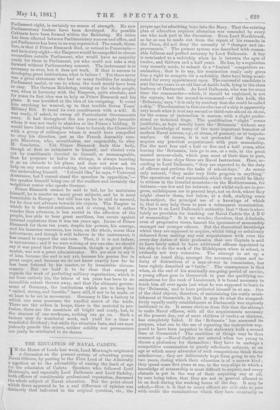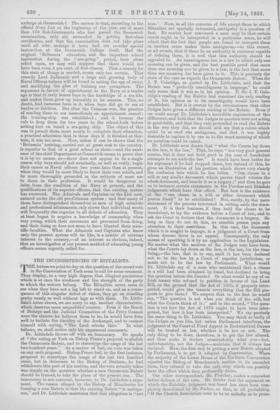THE EDUCATION OF NAVAL CADETS.
IN the House of Lords last week, Lord Monteagle originated a discussion on the present system of educating young Naval Officers, by putting to the First Lord of the Admiralty a creation as to the advisability of raising the limit of age for the admission of Cadets. Speakers who followed Lord Monteagle, and especially Lord Dalhousie and Lord Sudeley, both officers of considerable professional reputation, discussed the whole subject of Naval education. But the point about which there appeared to be a real difference of opinion was distinctly that indicated in the original question, viz , the proper age for admitting boys into the Navy. That the existing plan of education requires alteration was conceded by every one who took part in the discussion. Even Lord Northbrook, as far as can be made out from the report of his remarks in the Times, did not deny the necessity of " changes and im- provements." The present system was described with reason- able fullness and perfect accuracy by Lord Dalhousie. A boy is nominated to a cadetship when he is between the ages of twelve, and thirteen and a half years. He has, by a regulation very recently made, to submit to a "limited " competitive ex- amination ; that is to say, his nomination really only gives him a right to compete for a cadetship, three boys being nomi- nated for every appointment open. The successful candidate is sent for two years to an old line-of-battle hulk, lying in the close harbour of Dartmouth. As Lord Dalhousie, who was for some time the commander—which, it should be explained, is not the captain, but the second-in-command—of this hulk, the ' Britannia,' says, "it is only by courtesy that she could be called a ship." The education in this simulacrum of a ship is apparently very much What it is at any second or third-rate school on shore, for the course of instruction is narrow, with a slight profes- sional or technical tinge. The qualification " slight" seems justifiable, as boys usually leave the ' Britannia' without any useful knowledge of many of the most important branches of modern Naval science, e.g., of steam, of gunnery, or of torpedo- warfare. Of course, it is not pretended that they can acquire any practical acquaintance with pure seamanship. For the next four and a half or five and a half years, after leaving the 'Britannia,' lads go to sea, as a rule, in the great masted armour-clads, which pass most of their time in port, because in those ships there are Naval Instructors. Here, ac- cording to Lord Dalhousie, " they are expected to do the duty of officers and perform the tasks of school-boys." As seems only natural, " they make very little progress in anything." The operations of real seamanship which they would be likely to witness in the ironclad monsters—in the Mediterranean, for instance—are few and far between ; and whilst such are in pro- gress, midshipmen are in general kept, not on deck, where they might observe them, but below, at a desk, studying some book-subject, the principal use of a knowlege of which is, that it may help them to pass a subsequent examination. We have it on Lord Dalhousie's authority, that " there is abso- lutely no provision for teaching our Naval Cadets the A B of seamanship." It is no wonder, therefore, that Admirale, even of progressive views, lament the ignorance of seamanship amongst our younger officers. But the theoretical knowledge which they are supposed to acquire, whilst being so sedulously debarred from making any real acquaintance with oven the every-day duties of their profession that one Captain is said to have lately asked to have additional officers appointed to his ship to do the work of the Midshipmen when at school, is evidently not very extensive. The attempt to set up a school on board ship, amongst the necessary noises and in- finity of distractions of a man-of-war in commission, has been rightly described as "futile." The consequence is that when, at the end of his nominally sea-going period of service, a young officer goes to Greenwich to pass the qualifying ex- aminations for the rank of Lieutenant, it is found necessary to teach him all over again just what he was supposed to learn in the 'Britannia,' and to have perfected himself in at sea. One of the chief objects, therefore, of maintaining the costly estab- lishment at Greenwich, is that it may do what the compara- tively equally costly establishment at Dartmouth was expressly instituted to do. It seems obvious from this that the attempt to make Naval officers, with all the acquirements necessary at the present day, out of mere children of twelve or thirteen, has completely failed. If the 4 Britannia' has answered its purpose, what can be the use of repeating the instruction sup- posed to have been imparted in that stationary hulk a second time at Greenwich ? The condition of things may be thus summed up :—Naval Cadets are entered when too young to choose a profession for themselves ; they have to undergo a competitive examination in purely scholastic subjects, at an age at which many advocates of such competitions think them mischievous ; they are deliberately kept from going to sea for two years, during which their education is of a narrow kind ; they spend some five years at sea, in the very ships in which a knowledge of seamanship is most difficult to acquire, and every obstacle is put in the way of their acquiring any at all, by care being taken that they are not in general allowed to be on deck during the working hours of the day. It may be asked,—How is it that so many officers aro still able to pass with credit the examinations which they have eventually to undergo at Greenwich ? The answer is that, according to the official Navy List at the beginning of the year, out of more than 170 Sub-Lieutenants who had passed the Greenwich examination, only six succeeded in getting first-class certificates, and that the examination does not take place until all who undergo it have had six months' special instruction at the Greenwich College itself. Had the original 'Britannia' education, and the imperfect school instruction during the " sea-going " period, been alone relied upon, we may well suppose that there would not have been even 4 per cent. of first-classes. That a remedy for this state of things is needed, seems only too certain. That remedy Lord Dalhousie and a large and growing body of Naval Officers believe will be found in raising the age of entry, and modifying the plan of training our youngsters. The argument in favour of appointment to the Navy at a tender age is that it early inures boys to the hardships of a sea-life, and makes them grow up insensibly to be seamen. This, no doubt, had immense force in it, when boys did go to sea at twelve or thirteen. But after the Crimean war, the practice of sending them to sea immediately on appointment ceased ; the training-ship was established ; and it became the rule to keep them for two years in the school-hulk before setting foot on board a sea-going ship. The object of this was to permit them more nearly to complete their education, a practical admission that in these days if it finished at thir- teen, it was too soon. Now, unless it can be shown that the 'Britannia' training, carried out at great cost to the country, is superior to that of a good school on shore—and the exist- ence of the chief Department at Greenwich seems to prove that it is by no means so—there does not appear to be a single reason why boys should not nominally, as well as really, begin their career as Naval officers two years later than at present, when they would be more likely to know their own minds, and be more thoroughly grounded in the subjects of most use to them in their profession. It would be dangerous to infer, from the condition of the Navy at present, and the qualifications of its superior officers, that the existing system has answered. The Admirals and Captains on the List now, entered under the old pre-Crimean system ; and that many of them have distinguished themselves as men of high scientific and professional attainments, only shows that individual worth will frequently rise superior to all defects of education. They at least began to acquire a knowledge of seamanship when very young, which their successors are prevented from doing, and their doing so does not seem to have blunted their scien- tific faculties. What the Admirals and Captains who know only the present system will be like, is a matter of extreme interest to the country,—of an interest so obvious, indeed, that an investigation of our present method of educating young officers seems urgently called for.







































 Previous page
Previous page